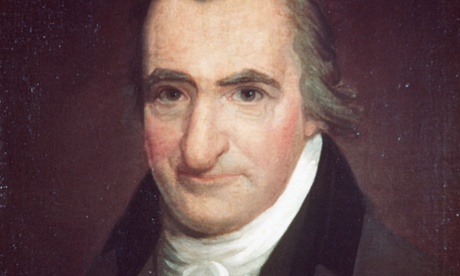
Name: Thomas Paine.
Age: 72. Or 278, had he lived.
Appearance: Very ... rights-y.
Thomas Paine! Founding father of a little place I like to call the United States of America! That’s the one.
“Corset-maker by trade, a journalist by profession and a propagandist by inclination,” I believe he has been called. Indeed. And born in Thetford, Norfolk, would you believe?
Well, that I did not know! Is this news to all? Is that why we’re talking about him? No. He’s in the news because he has been accused of plagiarism.
What monstrous calumny is this? Who besmirches the name of the man who virtually won the American revolution for George Washington? A historian at the University of Kansas, called Jonathan Clark.
What does this scoundrel claim? That the 6,000 words about the French revolution in Paine’s famous 1791 publication, Rights of Man, were written by the Marquis de Lafayette.
Of Lafayette, Texas? No.
Louisiana? No.
Indiana? California? No – it’s the title of French aristocrat Gilbert du Motier, a close friend of Washington, Hamilton and Jefferson and a military officer who fought for the US in the revolutionary war. He is known to have provided material for other parts of The Rights of Man.
So quoi? That doesn’t mean he wrote a great big, super-famous chunk of it. Non, mais Clark does point out that its unusually “eloquent, idealistic and visionary” tone stands out from the rest of the book.
Maybe Paine had had a soupcon of sherry by that point. He worked very hard, you know. In that section, “Paine” also boasts of knowing the “secret history” of French politics, which, as a low-born man unable to speak French at that time, he would not have done.
Well, peut-être … And “it reads like the English prose of a native-born French speaker”.
Oh, nonsense! What next? Shakespeare didn’t write Shakespeare? Katie Price didn’t write Being Jordan? Leonardo da Vinci didn’t paint The Da Vinci Code? Sit down for a moment, could you? We have much to discuss.
Do say: “The Gettysburg address. That’s still stirring, unsullied stuff.”
Don’t say: “These are the times that try men’s souls, eh, Tom? Hey, why are you writing that down?”

